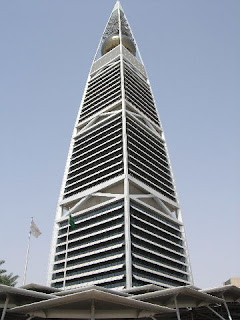
This weekend I visited Ad-Dir'iyah, the original capital of the Saudi State which was razed by Ottoman forces commanded by Ibrahim Pasha, son of the famous Egyptian (Albanian by birth) ruler Muhammad Ali in 1818. As you can see, they are rebuilding parts of the city on the old foundations. It was here that Muhammad ibn Abdul Wahhab took refuge with a regional tribal ruler named Muhammad ibn Al-Saud who embraced his message of reform. The ruins to the left are all that remain of Salwa Palace where that historic meeting took place. In 1765, ibn Al-Saud's son, Abdulaziz ibn Muhammad, conquered the neighboring city of Riyadh. Abdul Wahhab died in 1792 and Abdulaziz was assassinated in 1803, but the fledgling empired continue an to expand. They were able to gain control of the holy cities of Mecca and Medina and this victory took them into conflict with the mighty Ottoman Empire who asked their viceroy in Egypt to send an army.
 In 1814 the Ottomans retook the Holy Cities and on September 11, 1818, the destroyed the city of Ad-Dir'iyah and executed Abdullah the current ruler. I have to wonder, given Al-Qaeda burning hatred of the Saudi regime and their love of history, if the attacks on September 11 didn't have something to do with this event. Most of the subsequent rulers of Saudi Arabia have built their own palaces in the same region, though after the fall of Ad-Dir'iyah in 1891 to invaders from Hail, this area was never rebuilt. Currently there are extensive renovations on going -- though I don't know how long "on going" has been or will last.
In 1814 the Ottomans retook the Holy Cities and on September 11, 1818, the destroyed the city of Ad-Dir'iyah and executed Abdullah the current ruler. I have to wonder, given Al-Qaeda burning hatred of the Saudi regime and their love of history, if the attacks on September 11 didn't have something to do with this event. Most of the subsequent rulers of Saudi Arabia have built their own palaces in the same region, though after the fall of Ad-Dir'iyah in 1891 to invaders from Hail, this area was never rebuilt. Currently there are extensive renovations on going -- though I don't know how long "on going" has been or will last.Abdullah's son, Turki ibn Abdullah, retook Riyadh in 1824. This time the empire endured, fending off attacks from the Egyptians, the Ottomans, and the other Arab tribes, until 1891 when Abd al-Rahman ibn Faisal was defeated by the Al-Rashid clan and driven into exile in Kuwait with his son, Abdulaziz known to history as the founder of the modern state and often called simply ibn Saud in the West. The picture on the left depicts one of the doors in the old palace. They were intensely colorful and often the buildings were painted as well, especially white trim around the windows and along the edges of the roofline. The door is about four or five inches thick with a wooden lock that required a wooden key - one of which was on display in the courtyard. There was no museum, just a few objects in glass cases inside one of the buildings.
This picture depicts one of the old watch towers as well as the quarry where materials were procured, though most of the walls were made of mud brink --hence their very transience over time and the unlikelihood that most of what remains is in any sense original. The greenery is the Wadi Hanifa the agricultural region around Ad-Dir'iyah and Riyadh. Most of the trees are date palms which, of course, produce the quintessential fruit of the region famous both for its taste, but also for its ability to endure for months.
This is a reconstructed tower at Salwa palace. The zigzaging trail that leads visitors through the palace complex, which includes palaces, residences, a mosque, a bathhouse, watchtowers, and courtyards, is actually quite dangerous as crews of immigrant workers have dug trenches and holes everywhere installing what looks like a drainage system. I assume that this is for future visitor ammenities.
I was not permitted in this tower, but I found another one that was open -- though I still don't know whether it was strictly speaking permitted. The inisdes are cramped and cool with dusty floors and slit windows just large enough to peak out at the vast plains and, when necessary, stick out a weapon.
After Abdulaziz returned from Kuwait, he and some loyal followers stormed the fortress of the Al Rashid family (see the Masmak Fortress in a former post) located in Riyadh. They never returned to the old capital, but continued to use the fortifications in Riyadh. Masmak became, eventually, a prison and is now a museum. You can still see the battle scars from Abdulaziz's attack including holes in the door left by spears and bullet holes.
This is me in all my pasty-white glory outside the Faisal Tower, the only tower I was able to enter- albeit surrepticiously. My driver, Abdulrahman, took the photo. This tower was built by Faisal bin Turki one of the nineteenth century Kings of the Saudi State though it was mostly destroyed and has been only recently rebuilt.















